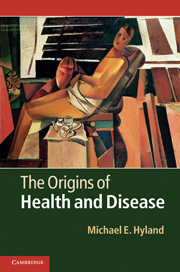Book contents
- Frontmatter
- Contents
- List of figures
- List of tables
- List of boxes
- Acknowledgements
- 1 The two philosophies: health, disease, medicine and psychotherapy
- 2 The body's mind: psychoneuroimmunology, stress and adaptive response
- 3 Personality, disease and the meaning of infornet dysregulation
- 4 Networks and their properties
- 5 The causes of dysregulation: associative learning, food intolerance and the effects of stress throughout the lifespan
- 6 The causes of dysregulation: supervised learning, repetitive strain injury, attention-deficit/hyperactivity disorder, chronic fatigue syndrome and depression
- 7 The causes of dysregulation: asthma and precursors to specific disease
- 8 Three different types of psychologically mediated therapy: placebos and the art of medicine, psychotherapy and complementary and alternative medicine
- 9 Therapeutic mechanisms
- 10 Finding the pattern: health in modern society
- 11 Infornet theory in perspective
- References
- Index
2 - The body's mind: psychoneuroimmunology, stress and adaptive response
Published online by Cambridge University Press: 05 June 2012
- Frontmatter
- Contents
- List of figures
- List of tables
- List of boxes
- Acknowledgements
- 1 The two philosophies: health, disease, medicine and psychotherapy
- 2 The body's mind: psychoneuroimmunology, stress and adaptive response
- 3 Personality, disease and the meaning of infornet dysregulation
- 4 Networks and their properties
- 5 The causes of dysregulation: associative learning, food intolerance and the effects of stress throughout the lifespan
- 6 The causes of dysregulation: supervised learning, repetitive strain injury, attention-deficit/hyperactivity disorder, chronic fatigue syndrome and depression
- 7 The causes of dysregulation: asthma and precursors to specific disease
- 8 Three different types of psychologically mediated therapy: placebos and the art of medicine, psychotherapy and complementary and alternative medicine
- 9 Therapeutic mechanisms
- 10 Finding the pattern: health in modern society
- 11 Infornet theory in perspective
- References
- Index
Summary
Introduction
The effect of mind on body is sometimes considered puzzling. It is only a puzzle if one makes incorrect assumptions about the nature of the relationship between mind and body, namely that the mind and body are separate entities. This chapter examines how the mind acts as a signal in the body's information system and in particular how the mind relates to the immune system. The chapter starts with a brief overview of assumptions about the mind.
The mind as an emergent property of the body
The influence of Cartesian dualism
The naive view of the relationship between mind and body is consistent with an interpretation that was suggested some 350 years ago by the philosopher René Descartes – an interpretation called Cartesian dualism. This naive view is very influential and many people subscribe to it without being fully aware of doing so.
According to Cartesian dualism, there is ‘body stuff’ and ‘mind stuff’ – i.e., two different sorts of ‘stuff’ that exist in the world. Furthermore, the mind stuff is able to influence the body stuff, as represented in Figure 2.1.
The naive view can be updated with the modern understanding that the brain is important to mental function. Because the mind is commonly assumed to be located in that part of the body called the brain, this dualistic view of psychosomatics can also be represented as shown in Figure 2.2.
- Type
- Chapter
- Information
- The Origins of Health and Disease , pp. 30 - 69Publisher: Cambridge University PressPrint publication year: 2011



